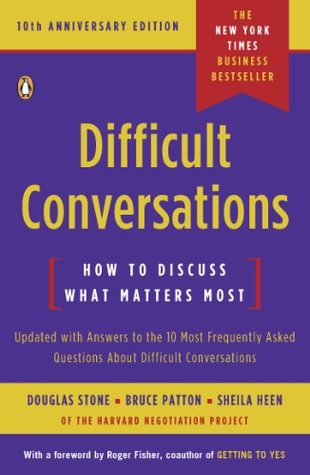More on this book
Community
Kindle Notes & Highlights
Read between
June 19 - October 24, 2023
When she complains, it’s not because she wants answers, it’s because she likes the connection she feels when she keeps people current on her daily comings and goings.
Our stories don’t come out of nowhere. They aren’t random. Our stories are built in often unconscious but systematic ways.
There’s nothing wrong with having these rules. In fact, we need them to order our lives.
What may help is to tell him about the impact his drinking has on you, and, further, to try to understand his story.
“You said I meant to hurt you. I have now clarified that I didn’t. So you should now feel fine, and if you don’t, that’s your problem.”
It has taken both of you to get into this mess. It will probably take both of you to get out.
When someone blames the victim, they are suggesting that the victim “brought it on themselves,” that they deserved or even wanted to be victimized.
When a relationship begins, infatuation may keep each partner from noticing any flaws in the other.
Taking responsibility for your contribution up front prevents the other person from using it as a shield to avoid a discussion of their own contribution.
We don’t cry or lose our temper because we express our feelings too often, but because we express them too rarely.
good listening requires an open and honest curiosity about the other person, and a willingness and ability to keep the spotlight on them.
Why is it that they express their feelings and preferences, but you cope with yours privately?
We can’t change someone else’s mind or force them to change their behavior.
Believing there’s some appropriate time frame for getting over something is just one more way to keep yourself stuck.
Letting Go Doesn’t Mean I No Longer Care.
Neither person can force the other to engage in a conversation.
“I have to admit that as much as I want to hear what you have to say, I’m feeling a little defensive right now.”
In a difficult conversation your primary task is not to persuade, impress, trick, outwit, convert, or win over the other person. It is to express what you see and why you see it that way, how you feel, and maybe who you are.
what is most important to me must be spoken, made verbal and shared, even at the risk of having it bruised or misunderstood…
Most of us actually prefer being with someone who will speak their mind. Angela broke off her engagement because her fiancé was “too nice.” He never stated a preference, never argued, never raised his voice, never asked for anything. While she appreciated his kindness, she felt something was missing: him.
to hide parts of who we are, we end up hiding all of who
we are.
Clarity is the key.
presenting your story as the truth — which creates resentment, defensiveness, and leads to arguments — is a wholly avoidable disaster.


